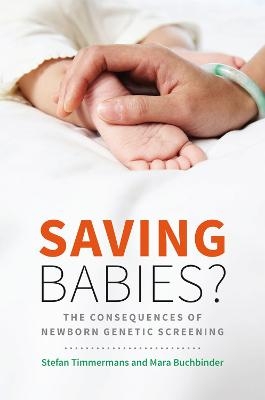
Saving Babies?
The Consequences of Newborn Genetic Screening
Seiten
2012
University of Chicago Press (Verlag)
978-0-226-92497-7 (ISBN)
University of Chicago Press (Verlag)
978-0-226-92497-7 (ISBN)
- Titel z.Zt. nicht lieferbar
- Versandkostenfrei innerhalb Deutschlands
- Auch auf Rechnung
- Verfügbarkeit in der Filiale vor Ort prüfen
- Artikel merken
Suitable for scholars of medicine, public health, and public policy, this title evaluates the consequences and benefits of state-mandated newborn screening - and the larger policy questions they raise about the inherent inequalities in American medical care that limit the effectiveness of this potentially lifesaving technology.
It has been close to six decades since Watson and Crick discovered the structure of DNA and more than ten years since the human genome was decoded. Today, through the collection and analysis of a small blood sample, every baby born in the United States is screened for more than fifty genetic disorders. Though the early detection of these abnormalities can potentially save lives, the test also has a high percentage of false positives - inaccurate results that can take a brutal emotional toll on parents before they are corrected. Now some doctors are questioning whether the benefits of these screenings outweigh the stress and pain they sometimes produce. In "Saving Babies?" Stefan Timmermans and Mara Buchbinder evaluate the consequences and benefits of state-mandated newborn screening - and the larger policy questions they raise about the inherent inequalities in American medical care that limit the effectiveness of this potentially lifesaving technology.
Drawing on observations and interviews with families, doctors, and policy actors, Timmermans and Buchbinder have given us the first ethnographic study of how parents and geneticists resolve the many uncertainties in screening newborns. Ideal for scholars of medicine, public health, and public policy, this book is destined to become a classic in its field.
It has been close to six decades since Watson and Crick discovered the structure of DNA and more than ten years since the human genome was decoded. Today, through the collection and analysis of a small blood sample, every baby born in the United States is screened for more than fifty genetic disorders. Though the early detection of these abnormalities can potentially save lives, the test also has a high percentage of false positives - inaccurate results that can take a brutal emotional toll on parents before they are corrected. Now some doctors are questioning whether the benefits of these screenings outweigh the stress and pain they sometimes produce. In "Saving Babies?" Stefan Timmermans and Mara Buchbinder evaluate the consequences and benefits of state-mandated newborn screening - and the larger policy questions they raise about the inherent inequalities in American medical care that limit the effectiveness of this potentially lifesaving technology.
Drawing on observations and interviews with families, doctors, and policy actors, Timmermans and Buchbinder have given us the first ethnographic study of how parents and geneticists resolve the many uncertainties in screening newborns. Ideal for scholars of medicine, public health, and public policy, this book is destined to become a classic in its field.
Stefan Timmermans is professor and chair of sociology at the University of California, Los Angeles and the author of Postmortem: How Medical Examiners Explain Suspicious Deaths, among other books. Mara Buchbinder is assistant professor of social medicine and adjunct assistant professor of anthropology at the University of North Carolina at Chapel Hill.
| Erscheint lt. Verlag | 4.1.2013 |
|---|---|
| Reihe/Serie | Fieldwork Encounters and Discoveries |
| Sprache | englisch |
| Maße | 16 x 23 mm |
| Gewicht | 567 g |
| Themenwelt | Medizin / Pharmazie ► Gesundheitswesen |
| Medizin / Pharmazie ► Medizinische Fachgebiete ► Medizinethik | |
| Medizin / Pharmazie ► Medizinische Fachgebiete ► Pädiatrie | |
| Studium ► 2. Studienabschnitt (Klinik) ► Humangenetik | |
| Studium ► Querschnittsbereiche ► Geschichte / Ethik der Medizin | |
| Studium ► Querschnittsbereiche ► Prävention / Gesundheitsförderung | |
| Sozialwissenschaften ► Soziologie | |
| ISBN-10 | 0-226-92497-1 / 0226924971 |
| ISBN-13 | 978-0-226-92497-7 / 9780226924977 |
| Zustand | Neuware |
| Haben Sie eine Frage zum Produkt? |
Mehr entdecken
aus dem Bereich
aus dem Bereich
Eine sehr persönliche Geschichte | Der New York Times-Bestseller
Buch | Softcover (2023)
Ullstein Taschenbuch Verlag
21,99 €
Die revolutionäre Medizin von morgen (Lifespan)
Buch | Softcover (2020)
DuMont Buchverlag
16,00 €


